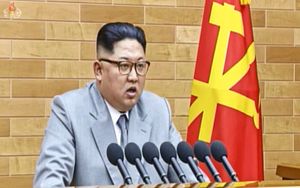On Monday, North Korean leader Kim Jong-un delivered his 2018 New Year’s Day address, as he has done every year since 2013. In the address, Kim celebrated the completion of North Korea’s nuclear weapons and ballistic missile programs, offered to enter conditional talks with South Korea with the offer of potentially sending a delegation to the upcoming Pyeongchang Winter Olympics in South Korea, and condemned international sanctions. Kim Jong-un, while acknowledging the “unprecedented” level of sanctions the country had endured in 2017, said that North Korea would have to improve its “ability to be self-reliant.”
A Nuclear Button
After reiterating that his country had “completed” its nuclear deterrent against the United States — a fact that its state media proclaimed following the successful flight-test of the Hwasong-15 intercontinental-range ballistic missile on November 29 — Kim added that he had a “nuclear button” physically installed on his desk in his office. The implication of the statement was clear: Kim, and only Kim, could launch North Korea’s nuclear weapons.
While this is the first time Kim Jong-un has alluded to having a physical means of launching his country’s nuclear weapons in his office — most likely to predetermined targets in the Northeast Asia and the continental United States — the fundamental nuclear command-and-control message from North Korea remains unchanged since 2013. That year, the Supreme People’s Assembly promulgated an ordinance on North Korea’s position as a “nuclear weapons state.” That ordinance, among other things, noted that “The nuclear weapons of the DPRK can be used only by a final order of the Supreme Commander of the Korean People’s Army to repel invasion or attack from a hostile nuclear weapons state and make retaliatory strikes.”
Whether or not Kim Jong-un has a physical button to authorize launch or not, it remains the case that North Korea’s nuclear weapons continue to see highly centralized and assertive command and control. (This may not be the case in a crisis, where Kim Jong-un may be forced to tolerate some level of predelegation to retain credible retaliatory capability.) Kim, nevertheless, appeared pleased with his arrangement: “The U.S. could never launch a military attack on me,” he said.
The implication, for now, is simple: Kim Jong-un’s nuclear forces are operational and ready to deter the United States and retaliate to any first strike that would seek to either disarm Kim Jong-un of his weapons or kill him.
Open For Talks?
Beyond his talk of a “nuclear button,” Kim Jong-un’s most diplomatically significant remark in the address concerned inter-Korean relations. He appeared open to the prospect of sending a North Korean delegation to the upcoming Winter Olympics, which will be hosted by South Korea at Pyeongchang in February 2018. South Korean President Moon Jae-in, as part of his pursuit of engagement with the North, has called for North Korea’s participation. “I hope that North Korea will also participate, which will provide a very good opportunity for inter-Korean peace and reconciliation,” Moon said in November 2017, during North Korea’s two-month-long pause in ballistic missile testing. “We truly wish the South a successful Olympics,” Kim said in his address.
North Korean participation in the Olympics, however, cannot be taken for granted at this point. Kim Jong-un laid down a clear and predictable quid pro quo that may prove to be a bridge too far for the U.S.-South Korea alliance at a time when it is being tested by North Korea’s successfully acquisition of an ICBM capability in 2017. South Korea has already requested that the United States consider delaying the start of the annual springtime Foal Eagle/Key Resolve exercises until after the conclusion of Paralympics in March. Modifying the joint military exercises further, as per Kim Jong-un’s request, while perhaps palatable for the Moon government, will find little support in Washington, D.C., as the Trump administration looks to continue its so-called maximum pressure campaign against North Korea.
Juche 2018?
As in previous years, the North Korean economy and self-reliance featured prominently in Kim’s speech. In 2017, North Korea saw three new major United Nations Security Council resolutions passed — two after its tests of the Hwasong-14 and Hwasong-15 ICBMs and one after its claimed test of a thermonuclear bomb in September 2017. Kim, in his address, said that North Korea should boost its production of iron and better manage its electricity as sanctions bear down. Under the newest sanctions, North Korea is able to export fewer commodities than ever before and is limited in the quantity of refined and crude petroleum products it can import, among other restrictions.

































